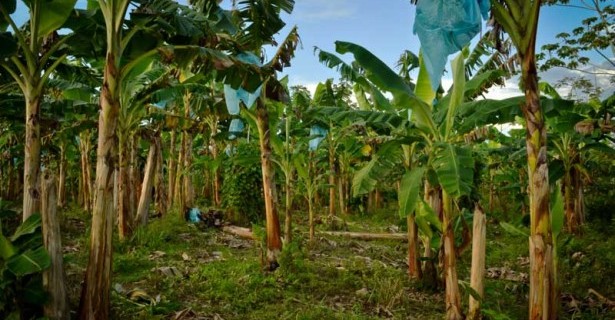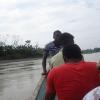Mandé Norte again putting Atrato communities at risk

We went through the war, and anyone who experiences war never wants to do so again — so we made the decision to return to our territory after the displacements. (Confidential testimony)

We went through the war, and anyone who experiences war never wants to do so again — so we made the decision to return to our territory after the displacements. (Confidential testimony)

6th may. Colombia reports – various indigenous communities in the Bajo Atrato gathered at Riosucio Chocó for the “ encuentro de los pueblos indigenas frinterizos del bajo Atrato y despesida Aquileíto mecheche vive” ( meeting of border indigenous communities from Bajo Atrato and farewell for Aquileíto Mecheche Vive) , in order to protest about the sistematic murder of indigenous leaders and highlight the serious human rights situation emerging in the territory.
 A stand of plantain trees in northern Colombia, where returning refugees say they are being displaced by a paramilitary-backed banana ‘invasion.’
A stand of plantain trees in northern Colombia, where returning refugees say they are being displaced by a paramilitary-backed banana ‘invasion.’
Residents involved in land restitution say that they live with constant threats, and that abduction, torture and murder remain common fates. Death lists are widely circulated.

As governments, companies, non-governmental organizations and ethnic communities address increased investment in extractives in Colombia, critical questions arise on how to ensure policies and practices are more aligned with respecting the human rights enshrined in Colombian and international legal frameworks, particularly in the context of internal armed conflict.
Careperro Mountain ("Haykatumá in the indigenous Embera language,) is one of the most sacred and important sites for the Embera culture. Beneath this mountain, lies gold, copper and other minerals. When the government awarded nine mining titles to the U.S. company Muriel Mining Corporation in 2005, for the purpose of extracting natural resources in the Chocó, the Embera communities were strongly opposed from the start.

The Washington Office on Latin America visited Chocó in March 2012. Alarmed by the severity of grave human rights situation in Chocó, we support the following statement issued by Diocese of Quibdó. We also encourage the U.S. government to promptly act in order to guarantee human rights and territorial rights for Chocó’s Afro-Colombian and indigenous peoples and to promote efforts that dismantle the military, political and economic operations of illegal armed groups in the Chocó.
Squeezed between the Pacific Ocean and the Andes, covered by thick, forbidding jungle and drenched by so much rain that it’s among the wettest places on Earth, the Colombian region of Chocó was described by the anthropologist Michael Taussig as “one of the most remote regions of the world.”
We, the undersigned U.S. religious and non-governmental organizations who work on Colombia, are writing to ask that you intervene in the human rights situation in the Bajo Atrato River region of the Chocó. On January 13, Argénito Díaz community leader from Llano Rico was shot dead. This murder follows the killing of three other Afro-Colombians (Manuel Moya, Graciano Blandón and his son Yair) in December 2009, the August 2009 murder of Curvaradó community leader Benjamín Gómez and ‘Chemita’ of the Cacarica community in July 2009.